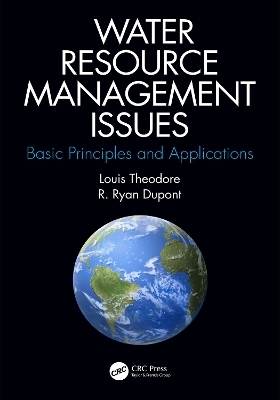
Water Resource Management Issues
CRC Press (Verlag)
978-0-367-18385-1 (ISBN)
Drinking Water Safety: Basic Principles and Applications, examines the technical and scientific, as well as regulatory, ethical, and emerging issues of pollution prevention, sustainability, and optimization for the production and management of safe drinking water to cope with environmental pollution, population growth, increasing demand, terrorist threats, and climate change pressures. It presents a summary of conventional water and wastewater treatment technologies, in addition to the latest processes.
Features include:
Provides a summary of current and future of global water resources and availability.
Summarizes key U.S. regulatory programs designed to ensure protection of water quality and safe drinking water supplies, with details on modern approaches for water utility resilience.
Examines the latest water treatment technologies and processes, including separate chapters on evaporation, crystallization, nanotechnology, membrane-based processes, and innovative desalination approaches.
Reviews the specialized literature on pollution prevention, sustainability, and the role of optimization in water treatment and related areas, as well as references for further reading.
Provides illustrative examples and case studies that complement the text throughout, as well as an appendix with sections on units and conversion constants.
Raised in Hell’s Kitchen, Lou Theodore received the degrees of M.Ch.E and Eng.Sc.D from New York University and B.Ch.E. from The Cooper Union. Over the past 50 years, Dr. Theodore has been a successful educator at Manhattan College (holding the rank of Full Professor of Chemical Engineering), Graduate Program Director, researcher, professional innovator, and technical communicator. During this period, he was primarily responsible for his program achieving a No. 2 ranking by the US News & World Report, and particularly successful in placing students in internships, jobs, and graduate schools. Dr. Theodore is an internationally recognized lecturer who has provided more than 200 courses to industry, government and technical associations. Dr. Theodore developed and served as the principal moderator/lecturer for US EPA courses on hazardous waste incineration and air pollution control equipment, consulted for several industrial companies in the field of pollution prevention and environmental management, and served as a consultant/expert witness for the US EPA and US Department of Justice. Dr. Theodore is the author of more than 90 text/reference books ranging from Pollution Prevention to Air Pollution Control to Hazardous Waste Incineration and Engineering and Environmental Ethics. Dr. Theodore is the recipient of the Air and Waste Management Association's (AWMA) prestigious Ripperton award that is "presented to an outstanding educator who through example, dedication and innovation has so inspired students to achieve excellence in their professional endeavors." He was also the recipient of the American Society for Engineering Education (ASEE) AT&T Foundation award for "excellence in the instruction of engineering students." He currently serves as a part-time consultant to Theodore Tutorials. Dr. Theodore is a member of Phi Lambda Upsilon, Sigma Xi, Tau Beta Pi, American Chemical Society, American Society of Engineering Education, Royal Hellenic Society, and a Fellow of the Air & Waste Management Association. Dr. Dupont has more than 35 years of experience teaching and conducting applied and basic research in environmental engineering at the Utah Water Research Laboratory at Utah State University. His main research areas have addressed soil and groundwater bioremediation, stormwater management via green infrastructure, field remediation technology demonstration and treatment system performance verification, and water reuse technology performance and risks. He received a BS degree in Civil Engineering, and MS and PhD degrees in Environmental Health Engineering from the University of Kansas, Lawrence. Dr. Dupont has been a Full Professor of Civil and Environmental Engineering at USU since 1995, served as the Head of the Environmental Engineering Division for 10 years, was instrumental in establishing an Undergraduate Degree in Environmental Engineering at USU, and has been responsible for attracting more than $6 million in extramural funding through the Water Research Lab since joining the faculty in 1982. Dr. Dupont is a member of Sigma Xi, Tau Beta Pi, Chi Epsilon, the American Society of Civil Engineers, the American Society of Engineering Educators, the Water Environment Federation, the Solid Waste Association of North America, Engineers without Borders, and the Air and Waste Management Association. Dr. Dupont was recognized as an Outstanding Young Engineering Educator by the American Society of Engineering Education, and was a 2015 recipient of the Richard I. Stessel Waste Management Award, for "distinguished achievement as an educator in the field of waste management" from the Air and Waste Management Association.
SECTION I Overview Chapter 1 Glossary of Terms Chapter 2 Historical Perspective Chapter 3 Water Properties Chapter 4 Water Chemistry Chapter 5 Environmental Regulatory Framework Chapter 6 The Clean Water Act Chapter 7 The Safe Drinking Water Act Chapter 8 Water Monitoring and Analysis SECTION II Water Resources Chapter 9 Water Resources of the United States Chapter 10 Global Water Resources SECTION III Water Treatment Technologies Chapter 11 Drinking Water Treatment Chapter 12 Municipal Wastewater Treatment Chapter 13 Industrial Wastewater Treatment Chapter 14 Evaporation Chapter 15 Membrane Separation Processes Chapter 16 Crystallization Chapter 17 Nanotechnology SECTION IV The Future Chapter 18 New Options for Water Desalination Chapter 19 Terrorism Considerations Chapter 20 The Pollution Prevention Approach Chapter 21 Sustainability Chapter 22 The Role of Optimization Chapter 23 Ethical Considerations Chapter 24 Future U.S. Water Security
| Erscheinungsdatum | 04.12.2019 |
|---|---|
| Zusatzinfo | 46 Tables, black and white; 100 Illustrations, black and white |
| Verlagsort | London |
| Sprache | englisch |
| Maße | 178 x 254 mm |
| Gewicht | 934 g |
| Themenwelt | Naturwissenschaften ► Biologie ► Ökologie / Naturschutz |
| Naturwissenschaften ► Geowissenschaften ► Hydrologie / Ozeanografie | |
| Technik ► Umwelttechnik / Biotechnologie | |
| ISBN-10 | 0-367-18385-4 / 0367183854 |
| ISBN-13 | 978-0-367-18385-1 / 9780367183851 |
| Zustand | Neuware |
| Haben Sie eine Frage zum Produkt? |
aus dem Bereich


